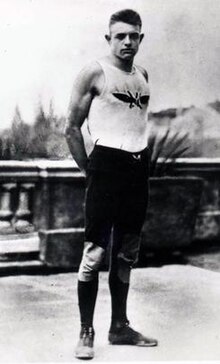Robin Reed
 |
|||||||||||||
| Personal information | |||||||||||||
|---|---|---|---|---|---|---|---|---|---|---|---|---|---|
| Born |
October 20, 1899 Pettigrew, Arkansas, United States |
||||||||||||
| Died |
December 20, 1978 (aged 79) Salem, Oregon, United States |
||||||||||||
|
Medal record
|
|||||||||||||
Robin Reed (October 20, 1899 – December 20, 1978) is considered among the greatest amateur wrestlers in the history of the sport. Throughout his career he never lost a wrestling match, official or unofficial, to anyone at any weight class. He was known for winning a gold medal at the 1924 Summer Olympics, leading Oregon State to its first team national championship, and for consistently wrestling in the 170 pound weight division despite his actual weight being close to 140.
Reed was born in Pettigrew, Arkansas, but first took up wrestling at Portland's Franklin High School, where he took the class in order to get out of having to take gym. He is quoted as saying: "I needed gymnasium credits to graduate from high school, but I didn't want any gym because I was already getting all the exercise I needed operating an air hammer at the shipyards. I was only 125 pounds and could barely hold onto that air hammer, so I was getting all the gym I needed." He learned quickly and dominated the competition, going undefeated throughout his time there.
After high school he attended Oregon State University (then known as Oregon Agricultural College), and won every match he was in, winning the 125-pound National AAU championship in 1921 and the 135-pound championship in 1922 and 1924 (He failed to win a title in 1923, despite winning every match he was in). While still a student at Oregon State, he coached the local Corvallis High School wrestling team to win the state championship.
While still attending Oregon State, Robin participated in the 1924 Pacific Northwest Olympic team trials. He entered the 145.5, 158.5, 174.0, and 192.0 pound weight classes, and won them all. He made the Olympic team, and on the boat trip to Europe he had unofficial matches against every other member of the United States team. It was widely known that he had the ability to pin every member of the team , and on this occasion he nearly accomplished that, pinning 12 out the 13 of them, all but the person who would become the gold medalist at heavyweight that year, Harry Steel (He still beat him, however, despite not being able to pin him).
...
Wikipedia
